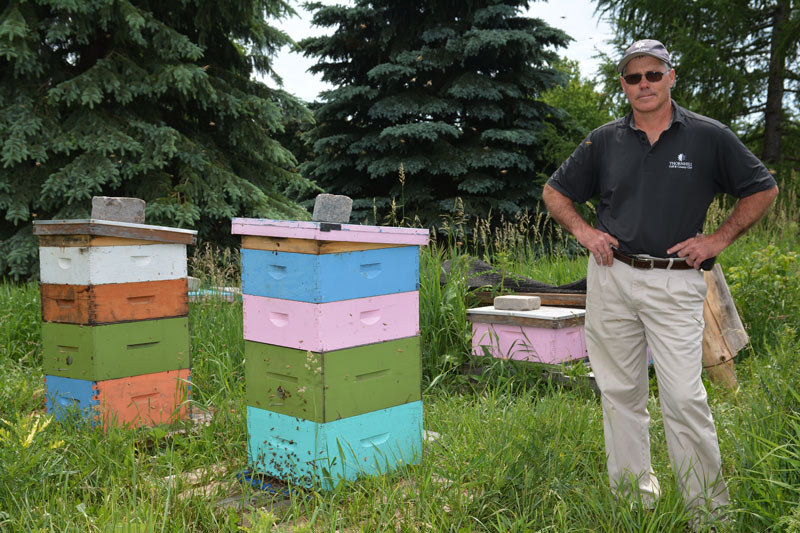
Superintendent Greg McFarlane with his honey bee hive setup at Thornhill Golf & Country Club in Ontario. The honey harvests star in palate-pleasing preparations by Thornhill executive chef Tim Ayiotis, such as homemade granola bars, ice cream, and honey-garlic sauce for chicken wings. Photo courtesy of Brent Long
Growing up in Australia, Greg McFarlane never imagined a life as a greenkeeper, let alone as a beekeeper, but the superintendent, who is in his 22nd season at Thornhill Golf & Country Club near Toronto (10th as head superintendent), has added that extra line to his résumé this year.
Catching up with the veteran turf boss on a summer day finds him keeping watch over his busy honey bees. McFarlane began with four hives this past spring and has since expanded to nine. “I thought about beekeeping for a few years after seeing a fellow superintendent experiment with a few hives,” says McFarlane, a 21-year GCSAA member. “I didn’t realize how much was involved. I thought if I put the hives there, the bees would make honey, and that was about it, but there is a lot more to bee husbandry. I’ve become fascinated by it. We provide a habitat and environment the bees need; the honey is a bonus.”
Over the next two months, the bees will produce the majority of the year’s honey harvest. After the sweet ingredient has been gathered, Thornhill executive chef Tim Ayiotis will put it to use in culinary delights such as his poached pears in honey, a menu favorite.
Although he’s been stung by the beekeeping bug, McFarlane says he’s actually only been pricked by the insects a couple of times. “In the middle of the summer, on a sunny day, the bees are so preoccupied with what they are doing, you can stand in the middle of them and they don’t bother you,” he says.
Beekeeping is just one of many ways Thornhill strives to be an environmental steward and embrace sustainability-minded practices. In addition to the 18-hole golf course’s status as a Certified Audubon Cooperative Sanctuary, the club takes a homegrown, farm-to-table — or, rather, “golf-course-to-table” — approach to its dining operations, with the golf course maintenance staff working side by side with the kitchen staff.
“We’re a golf course first and foremost, but we also recognize that we play a big part in the natural environment that encompasses the property, and we strive to preserve and enhance what Mother Nature has given us,” McFarlane says. Since 2008, he has worked with Global Organic Partners, a company that consults on pesticide reduction on golf courses, to decrease Thornhill’s pesticide use annually without negatively impacting turf conditions. Currently, the superintendent estimates the course uses about 2.7 kilograms (about 6 pounds) per hole annually. This pesticide reduction program (which is also in play at Toronto’s Oakdale Golf & Country Club) has been so successful that Thornhill is now using approximately 95 percent less active ingredients in pesticides and fertilizers than the other top-100 private clubs in Ontario, as confirmed by a KPMG audit.
Water is one of the biggest issues facing superintendents today. In fall 2010, Thornhill built a 1.3-acre pond to serve as an aesthetic feature on the eighth hole as well as the course’s source of irrigation. The pond has become home to snapping and painted turtles, frogs, toads, ducks, and native fish, including largemouth bass.
McFarlane planted a vegetable garden next to the maintenance shop five years ago. The plot started small, but has gained ground every year, and it now yields specialty cauliflower, squash, potatoes, tomatoes, carrots, cucumbers, kale, Swiss chard, lettuce, 200 bulbs of garlic and a wide variety of herbs. All the produce goes to the club’s kitchen, helping give members an authentic farm-to-table dining experience while at Thornhill.
“I like to call it ‘the farm,’ and we’re putting it to work for the members to enjoy the fruits of our labor and love for the property,” says Ayiotis, who has been the club’s executive chef for four years. “Our members eat differently here, and I think they have come to appreciate that. We’re about creating menu items that are homemade, handmade, made fresh, as local as we can make it. Almost everything we use is grown or produced within a 100-kilometer radius.”
To top it all off, earlier this year, the superintendent and his crew also coaxed sap from the 100-year-old sugar maples throughout the 150-acre property, which Chef Ayiotis then turned into pure, matchless maple syrup.
From superintendent to beekeeper to gardener to sap collector, what a long, rewarding — and sweet — trip it’s been for McFarlane.
David McPherson, a regular contributor to GCM, is a freelance writer based in Waterloo, Ontario.